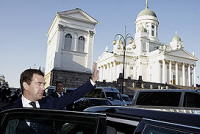Russia has published a proposal for a new global charter on international energy cooperation issues, including nuclear fuel trade, and sent it to countries including the G20.
 |
| Russian president Dimitry Medvedev in Helsinki (Image: Kremlin) |
The bilateral arrangements and legal instruments the proposal refers to are known as the Energy Charter Treaty (ECT), a multilateral initiative to build a legal foundation for energy security dating from the 1990s.
The ECT stemmed from the 1991 European Energy Charter, a political initiative to establish a commonly accepted foundation for developing energy cooperation between the states of the Eurasian continent and the then newly independent states of the former Soviet Union. The ECT, which was opened for signature in 1994, took the remit beyond the original's intention to promote energy cooperation between East and West, and is a legally binding multilateral instrument dealing specifically with intergovernmental cooperation in the energy sector with 52 signatories.
The fundamental aim of the ECT is to create a level playing field of rules to be observed by all participating governments, thus minimising the risks associated with energy-related investments and trade. Its provisions focus on five broad areas: protection and promotion of foreign energy investments; free trade in energy materials, products and energy-related equipment, based on WTO rules; freedom of energy transit through pipelines and grids; reducing the negative environmental impact of the energy cycle through improving energy efficiency; and mechanisms for the resolution of disputes. Uranium and spent nuclear fuel are included as energy materials and products under the terms of the ECT.
Although Russia has signed both the 1991 Energy Charter and the 1994 ECT, Medvedev noted at the press conference that it has never ratified them and therefore is not bound by their terms. It would appear that Russia intends its new proposals to provide a framework for a replacement for the ECT. "Our task now is to preserve, or rather, to provide for the future balance of interests – energy producers, transit states and consumers of energy," he said.
The new Russian proposal, titled Conceptual Approach to the New Legal Framework for Energy Cooperation (Goals and Principles), calls for a new universal, international, legally binding instrument which would include all major energy importing and exporting countries as well as countries of transit. Several European countries have experienced disruption to their gas supplies in recent winters as disputes between Russia and Ukraine have affected gas transit.
According to Medvedev, EU talks on the Russian proposals are due to begin "soon." How well the Russian proposals will be accepted by other countries remains to be seen, with commentators suggesting that they are too vague to do anything constructive towards improving energy security. Pierre Noel of the European Council on Foreign Relations, quoted in EUObserver, said "A treaty is only worth signing if it limits the room for manoeuvre of the people signing it….The Russians want to put on the table a treaty that will not constrain anyone."




_52351.jpg)


_15863.jpg)






